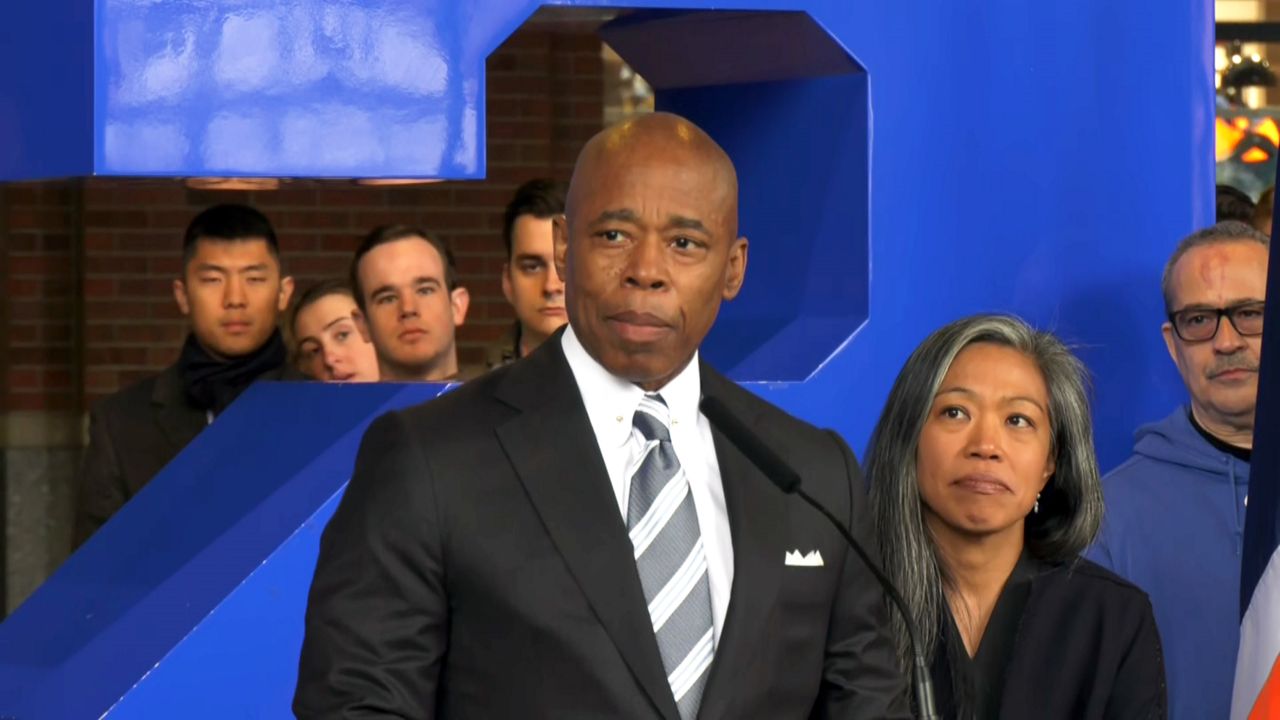NEW YORK — Mayor Eric Adams announced Thursday that local performers and pro athletes would no longer be required to be vaccinated to play in city venues, changing an exemption that had kept Nets basketball star Kyrie Irving off the court.
Adams said that the policy left city teams at a “competitive disadvantage,” and that expanding the vaccination exemption from just out-of-town performers and athletes to locally based ones would help the city’s economic recovery.
Adams’ decision comes as COVID-19 cases are rising slightly citywide.
“Today the decision we’re making, we're not making it loosely, haphazardly,” Adams said, speaking at a news conference at the Mets’ Citi Field stadium, in Queens. “We’re not doing it because there's pressures to do it. We’re doing it because this city has to function.”
Already Adams’ decision has come under strong criticism from union leaders representing city workers. Both private sector and municipal employees were required to get vaccinated under mandates created by the administration of former Mayor Bill de Blasio.
Union leaders said that allowing city-based performers and athletes to work without vaccination presents a double standard unfair to city workers who faced the prospect of losing their jobs if they didn’t get vaccinated.
“We have been suing the city for months over its arbitrary and capricious vaccine mandate — this is exactly what we are talking about,” Pat Lynch, president of the city’s largest police union, said in a statement. “If the mandate isn’t necessary for famous people, then it’s not necessary for the cops who are protecting our city in the middle of a crime crisis.”
The mandates led to more than 1,400 city workers losing their jobs after refusing to get vaccinated. Adams said he was not considering hiring those workers back.
Adams also received criticism from City Council Speaker Adrienne Adams, who said she worried that the Adams administration is sending "increasingly ambiguous messages" on public health to New Yorkers.
"This exemption sends the wrong message that higher-paid workers and celebrities are being valued as more important than our devoted civil servants, which I reject," Speaker Adams said. "This is a step away from following sensible public health-driven policies that prioritize equity."
Yet Mayor Adams countered that the expansion of the performer and athlete exemption was necessary because those people are a small group who have an outsize impact on the city’s economy, and that his administration waited until COVID-19 health indicators were in a safe place to “peel back” a layer of safety protections.
The previous version of the rule allowed performers and athletes visiting the city to appear at venues regardless of their vaccination status.
“This carve out already existed. It was unfair to New Yorkers,” Adams said. “It stated, if you come to our city, we’re going to treat you different than what we would treat New Yorkers.”
The rule change comes just ahead of the beginning of professional baseball's regular season, and of the NBA playoffs.
Randy Levine, general manager for the Yankees, said that there were "a few" players who had not yet been vaccinated. Mets general manager Sandy Alderson said that more than half of this players were unvaccinated, but declined to give specific numbers, citing privacy agreements related to union contracts with players.
Alderson said that some employees of the Mets' organization, including people who work in the stadium, were fired for not complying with the city's private employer vaccination mandate.
"There were one or two cases that came up that people were not prepared to be vaccinated. In their situations, they were terminated," Alderson said. "The players are unionized, and the players are sort of outside the scope of our mandate."
Dr. Mitchell Katz, head of the city’s hospital system, said he supports the rule change.
“What he's going to do is righting an unfairness that doesn't make any sense,” Katz said of the mayor. “I don't think it makes any sense or follows any particular science.”
Adams said that city lawyers had said expanding the exemption “passes legal muster,” despite the fact that earlier city vaccination mandates were upheld in court cases in part because they applied to all workers equally.
Adams suggested that there were more pandemic-era rules and restrictions that his administration was looking to change, but also said that he would “pivot” with the coronavirus if cases began to rise again in the city.
City public schools recently posted their largest week-over-week uptick since the peek of the omicron wave in January, NY1 editorial partner THE CITY reported.
Cases are also rising in the city, up slightly over recent weeks, according to city data.
Adams said that he had “respect” for frustration of employees — such as those working the ticket counter or concession stand in a sports venue — who feel that performers and athletes are getting a pass that they were not given.
“It's difficult to make decisions that you don't want to do,” Adams said. “I’m going to lean into my discomfort, so my city doesn't shut down.”
Adams framed the expansion of the vaccine exemption as a difficult decision and suggested that New Yorkers were lucky he was willing to make the change.
“You think this is the last tough decision I'm going to have to make as the mayor? No it’s not,” Adams said. “We should be glad there's a mayor who's willing to make tough decisions to take us through these tough times.”



